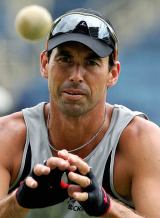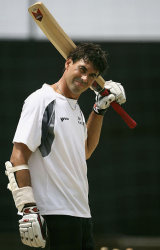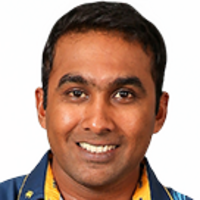New Zealand's evergreen captain
In the past six weeks, Stephen Fleming has reaffirmed his reputation as the thinking man's leader
Andrew Miller in Jamaica
23-Apr-2007
|
|

|
If there's one thing that this World Cup has taught us, it is that all things have a shelf life. Duncan Fletcher is perhaps the most prominent example of a good coach turned bad, but there have been enough off-colour performances from the likes of Sachin Tendulkar and Michael Vaughan to suggest that what once may have glittered on the international stage may not necessarily remain golden.
But then, poking proudly through the haze of smouldering reputations is a man who bucks the trend, and has done so for more than a decade. New Zealand's captain, Stephen Fleming, has been described so often as the greatest captain in world cricket that it has, at times, been hard to ascertain precisely what he's done to deserve such an accolade. In the past six weeks, however, he's reaffirmed his reputation as the thinking man's leader. Now, at the age of 34, he stands on the brink of fulfilment.
It was once said of Tim Henman that he was one of life's semi-finalists, and perhaps that's the same of New Zealand. Four times they have come this far, punching above their weight of population, but never have they gone further. But under Fleming's leadership, which he inherited from Lee Germon in the week of his 24th birthday, they have contested three World Cups, and only in the 2003 campaign, which was undermined by the costly forfeiture of a match in Nairobi, have they failed to get this far.
"It's just a case of dealing with the anxiety and nerves because it's unknown territory for New Zealand to go past this point," said a plain-speaking Fleming on the eve of the match. "Tomorrow is one of the biggest games this team will play. The pressure's on and it's a big occasion, but we know what to expect from Sri Lanka and we feel worthy of being here. We know that if we win one game at a time against these two sides, the World Cup's ours."
Standing in his way are a trio of captaincy opponents who, like Fleming, have moulded sides in their own image. Tuesday's counterpart is Mahela Jayawardene, whose deft touch, genial popularity and personal weight of performances has helped pull his country out of a tailspin since taking over from Marvan Atapattu last February. Awaiting him on the other side of the draw are two driven men who prefer to lead by example; South Africa's Graeme Smith and Australia's Ricky Ponting. Each would be a worthy man to lift the trophy, but they are all still young enough to come back for another tilt. For Fleming, who will be 38 come the 2011 edition, one senses this must surely be his last - and finest - chance.
If so, there is very little else he could have done to spur on his side. His leadership has been first-rate throughout the campaign, quick-witted when opportunities arose, but quick to learn on the occasions he has found himself outflanked. "Captaincy isn't a science," he said after losing to Sri Lanka at the Super Eights stage of the competition. "There is no right and wrong." Maybe not, but that doesn't mean you can't right your wrongs. Two days after that match, in a display of pride-swallowing that is the mark of the man, he changed his team and his tactics on the same sluggish Grenada pitch, and delivered the victory over South Africa that propelled his team into the knock-outs.
|
|

|
All throughout the Super Eights, Fleming had been the one leader who displayed the sort of spatial awareness that comes with such overwhelming experience. Tunnel vision has been the preferred method of Ponting and Smith in particular - nothing but the end game has mattered to them. In Ponting's case that has delivered nine emphatic victories in a row; Smith's in the meantime has been more up and down, but the up when it arrived was the biggest high of the competition to date - the surging victory against England in Barbados when the stakes were truly at their highest.
Fleming has not played it like that at all. He's displayed throughout a carefully cultivated inner meekness. He's been happy to embrace the role of the underdog but all the while he has been plotting and scheming to give his men that extra half-an-inch. His cunning manipulation of New Zealand's net run-rate, for instance, was an insurance policy that he did not, in the end, have to cash in. But had South Africa beaten the Kiwis, as they have done on four out of six occasions in the past 18 months, New Zealand would still surely have made it to the knock-outs through Fleming's carefully unlatched back door.
Fleming's batting has also been a revelation. One of the big questions that has hung over his career is "how good could he have been?" As a youngster, he shared more than just an April Fool's birthday with David Gower; he shared a languid line of strokeplay that was, by necessity, shelved when the burden of leadership was foisted upon him. For an eternity, he possessed one of the worst 50 to 100 conversion rates the game has ever seen, with just two Test centuries in his first eight years of international cricket. Now however, he is mature enough to lead with the bat and the brain in one go. His tally of 352 runs places him in the top 12 run-getters for the tournament, and for New Zealand he is second only to the prolific Scott Styris.
In less than a week, the speculation will be over and the 2007 World Champions will have been crowned. It may well be that the greatest prize is destined to elude the longest-serving leader in international cricket. But if it does, he will still be able to say that he carried out his campaign to the absolute limits of both his abilities and those of his countrymen. To reach your peak after a decade at the top is a rare and impressive achievement.
Andrew Miller is UK editor of Cricinfo

